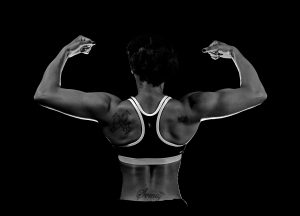If you find yourself on stage in front of a crowd in nothing but your bikini, one of two things is going on. One, you’re having a nightmare, or two, you’re a bodybuilding competitor.
For professional bodybuilders, training can turn into a nightmare with the wrong approach. Whether it’s your first competition or 10th, it takes a lot more than diet and exercise to compete in a way that keeps your metabolism and body image healthy.

Learning how to pose is important, but there are many ways to train correctly for a bikini competition. (U.S. Air Force photo/Senior Airman Christian Clausen)
It Takes More than a Coach and a Pose
Many of the old-school ideas about bikini competition prep hold true. You should still find a coach, learn how to pose, and give yourself plenty of time to train. But new-school prep gets much more technical, making it better for your results, your body, and your overall health. If you want prep for a bikini competition the right way, add the following elements to your training plan.
Know when to start.
Your bikini competition diet and prep will last about 12 weeks, but you shouldn’t begin this focused prep work until you’re carrying about 35 pounds of body fat. Body composition testing will give you the most accurate measurement. Speaking of body composition…
Track your body composition, not your weight.
You don’t walk on stage and step on a scale. You pose. That’s because bikini competitions are about body composition, not weight. You’ll get a more accurate picture of how your body is responding to your training if you use body composition tracking. Technology like InBody bioelectrical impedance analysis and/or Fit3D testing measure your body fat, muscle mass, and water levels with accuracy (and without the high cost of using DEXA). Plus, along with your “selfies,” your Fit3D results give you a perfectly objective view of your physique.
Knowing and understanding your results can help you make correct changes in your plan to bring the best “you” to the stage. Doing so also helps you choose the right competition date, based on how much body fat you have to lose. If you want to compete with the best, your total fat in pounds should be below 30 (as measured with the Inbody 570 scan, which uses tons of metrics for measurements) before you even think about stepping on stage. Things to watch for:
- High water levels: a sign of overtraining or overcarbing
- Drops in muscle mass numbers: less muscle means less chance of winning
Get a hormone analysis before you start.
One of the biggest roadblocks to success in bodybuilding is an underlying hormone issue. Even a mild imbalance can affect your progress. Get a complete metabolic assessment before you begin to have a working baseline. Elevated stress hormones, imbalances in sex hormones, or marginal thyroid function are red flags that need to be taken care of before even attempting competition.
Be careful of dropping your carb intake too much, or too long.
Cutting carbs is a tempting way to speed up weight loss, but go too low for too long, and you can hurt your metabolism. Also, studies show that dropping your carbohydrate intake below 30g/day can significantly lower your body’s T3 hormone levels. Body composition testing can help you monitor your intake and avoid the dreaded “washed out” look caused by carb spillover from excess carbs.
Monitor overtraining.
You’d think the more you work out, the better your body would be. But overtraining creates metabolism problems after the show. Save yourself by watching your Heart Rate Variability (HRV). This well-researched measurement of the sympathetic vs. parasympathetic stress on your heart will tell you if you need to pump the brakes or push harder, day to day. By measuring the difference in time between heartbeats, you’ll know how much training you can take on that day. Higher variability means less stress. Less variability means more stress. You also may be overtraining if your water levels spike.
Be smart with your protein intake.
You already know that you need more protein with rigorous exercise, but how much? Research says you should shoot for 0.73 to 0.82 grams per one pound of body weight per day to maximize protein synthesis (i.e., beef up). You could go higher than this, but it’s not going to help you gain muscle mass quicker.
We Have the Tools and Guidance to Help—No Matter Where You’re Located
Not sure where to get a metabolic assessment or hormone analysis? Twin Cities Metabolism offers virtual consultations and testing, so you can have a trusted guide no matter where you’re located the country. In the meantime, find the nearest Fit3D location near you, and stay tuned for Part 2 of our series on bikini competition prep…surviving the aftermath!
Ready to take charge of your health? We have the tests and customized nutrition programs you need. Get in touch.

One Comment